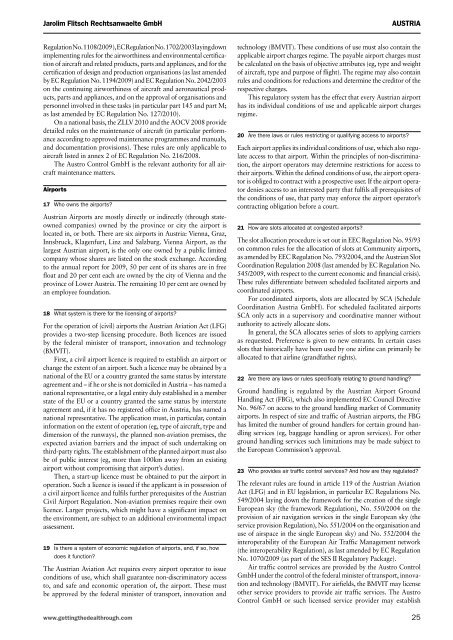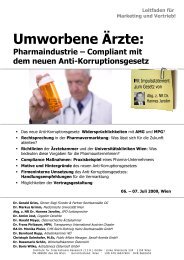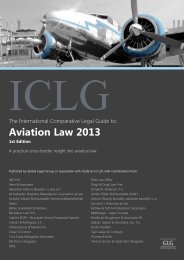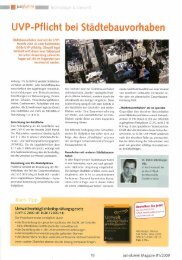Getting the deal through - Air Transport 2011 - Jarolim
Getting the deal through - Air Transport 2011 - Jarolim
Getting the deal through - Air Transport 2011 - Jarolim
Create successful ePaper yourself
Turn your PDF publications into a flip-book with our unique Google optimized e-Paper software.
<strong>Jarolim</strong> Flitsch Rechtsanwaelte GmbH<br />
AUSTRIA<br />
Regulation No. 1108/2009 ), EC Regulation No. 1702/2003 laying down<br />
implementing rules for <strong>the</strong> airworthiness and environmental certification<br />
of aircraft and related products, parts and appliances, and for <strong>the</strong><br />
certification of design and production organisations (as last amended<br />
by EC Regulation No. 1194/2009) and EC Regulation No. 2042/2003<br />
on <strong>the</strong> continuing airworthiness of aircraft and aeronautical products,<br />
parts and appliances, and on <strong>the</strong> approval of organisations and<br />
personnel involved in <strong>the</strong>se tasks (in particular part 145 and part M;<br />
as last amended by EC Regulation No. 127/2010).<br />
On a national basis, <strong>the</strong> ZLLV 2010 and <strong>the</strong> AOCV 2008 provide<br />
detailed rules on <strong>the</strong> maintenance of aircraft (in particular performance<br />
according to approved maintenance programmes and manuals,<br />
and documentation provisions). These rules are only applicable to<br />
aircraft listed in annex 2 of EC Regulation No. 216/2008.<br />
The Austro Control GmbH is <strong>the</strong> relevant authority for all aircraft<br />
maintenance matters.<br />
<strong>Air</strong>ports<br />
17 Who owns <strong>the</strong> airports?<br />
Austrian <strong>Air</strong>ports are mostly directly or indirectly (<strong>through</strong> stateowned<br />
companies) owned by <strong>the</strong> province or city <strong>the</strong> airport is<br />
located in, or both. There are six airports in Austria: Vienna, Graz,<br />
Innsbruck, Klagenfurt, Linz and Salzburg. Vienna <strong>Air</strong>port, as <strong>the</strong><br />
largest Austrian airport, is <strong>the</strong> only one owned by a public limited<br />
company whose shares are listed on <strong>the</strong> stock exchange. According<br />
to <strong>the</strong> annual report for 2009, 50 per cent of its shares are in free<br />
float and 20 per cent each are owned by <strong>the</strong> city of Vienna and <strong>the</strong><br />
province of Lower Austria. The remaining 10 per cent are owned by<br />
an employee foundation.<br />
18 What system is <strong>the</strong>re for <strong>the</strong> licensing of airports?<br />
For <strong>the</strong> operation of (civil) airports <strong>the</strong> Austrian Aviation Act (LFG)<br />
provides a two-step licensing procedure. Both licences are issued<br />
by <strong>the</strong> federal minister of transport, innovation and technology<br />
(BMVIT).<br />
First, a civil airport licence is required to establish an airport or<br />
change <strong>the</strong> extent of an airport. Such a licence may be obtained by a<br />
national of <strong>the</strong> EU or a country granted <strong>the</strong> same status by interstate<br />
agreement and – if he or she is not domiciled in Austria – has named a<br />
national representative, or a legal entity duly established in a member<br />
state of <strong>the</strong> EU or a country granted <strong>the</strong> same status by interstate<br />
agreement and, if it has no registered office in Austria, has named a<br />
national representative. The application must, in particular, contain<br />
information on <strong>the</strong> extent of operation (eg, type of aircraft, type and<br />
dimension of <strong>the</strong> runways), <strong>the</strong> planned non-aviation premises, <strong>the</strong><br />
expected aviation barriers and <strong>the</strong> impact of such undertaking on<br />
third-party rights. The establishment of <strong>the</strong> planned airport must also<br />
be of public interest (eg, more than 100km away from an existing<br />
airport without compromising that airport’s duties).<br />
Then, a start-up licence must be obtained to put <strong>the</strong> airport in<br />
operation. Such a licence is issued if <strong>the</strong> applicant is in possession of<br />
a civil airport licence and fulfils fur<strong>the</strong>r prerequisites of <strong>the</strong> Austrian<br />
Civil <strong>Air</strong>port Regulation. Non-aviation premises require <strong>the</strong>ir own<br />
licence. Larger projects, which might have a significant impact on<br />
<strong>the</strong> environment, are subject to an additional environmental impact<br />
assessment.<br />
19 Is <strong>the</strong>re a system of economic regulation of airports, and, if so, how<br />
does it function?<br />
The Austrian Aviation Act requires every airport operator to issue<br />
conditions of use, which shall guarantee non-discriminatory access<br />
to, and safe and economic operation of, <strong>the</strong> airport. These must<br />
be approved by <strong>the</strong> federal minister of transport, innovation and<br />
technology (BMVIT). These conditions of use must also contain <strong>the</strong><br />
applicable airport charges regime. The payable airport charges must<br />
be calculated on <strong>the</strong> basis of objective attributes (eg, type and weight<br />
of aircraft, type and purpose of flight). The regime may also contain<br />
rules and conditions for reductions and determine <strong>the</strong> creditor of <strong>the</strong><br />
respective charges.<br />
This regulatory system has <strong>the</strong> effect that every Austrian airport<br />
has its individual conditions of use and applicable airport charges<br />
regime.<br />
20 Are <strong>the</strong>re laws or rules restricting or qualifying access to airports?<br />
Each airport applies its individual conditions of use, which also regulate<br />
access to that airport. Within <strong>the</strong> principles of non-discrimination,<br />
<strong>the</strong> airport operators may determine restrictions for access to<br />
<strong>the</strong>ir airports. Within <strong>the</strong> defined conditions of use, <strong>the</strong> airport operator<br />
is obliged to contract with a prospective user. If <strong>the</strong> airport operator<br />
denies access to an interested party that fulfils all prerequisites of<br />
<strong>the</strong> conditions of use, that party may enforce <strong>the</strong> airport operator’s<br />
contracting obligation before a court.<br />
21 How are slots allocated at congested airports?<br />
The slot allocation procedure is set out in EEC Regulation No. 95/93<br />
on common rules for <strong>the</strong> allocation of slots at Community airports,<br />
as amended by EEC Regulation No. 793/2004, and <strong>the</strong> Austrian Slot<br />
Coordination Regulation 2008 (last amended by EC Regulation No.<br />
545/2009, with respect to <strong>the</strong> current economic and financial crisis).<br />
These rules differentiate between scheduled facilitated airports and<br />
coordinated airports.<br />
For coordinated airports, slots are allocated by SCA (Schedule<br />
Coordination Austria GmbH). For scheduled facilitated airports<br />
SCA only acts in a supervisory and coordinative manner without<br />
authority to actively allocate slots.<br />
In general, <strong>the</strong> SCA allocates series of slots to applying carriers<br />
as requested. Preference is given to new entrants. In certain cases<br />
slots that historically have been used by one airline can primarily be<br />
allocated to that airline (grandfa<strong>the</strong>r rights).<br />
22 Are <strong>the</strong>re any laws or rules specifically relating to ground handling?<br />
Ground handling is regulated by <strong>the</strong> Austrian <strong>Air</strong>port Ground<br />
Handling Act (FBG), which also implemented EC Council Directive<br />
No. 96/67 on access to <strong>the</strong> ground handling market of Community<br />
airports. In respect of size and traffic of Austrian airports, <strong>the</strong> FBG<br />
has limited <strong>the</strong> number of ground handlers for certain ground handling<br />
services (eg, baggage handling or apron services). For o<strong>the</strong>r<br />
ground handling services such limitations may be made subject to<br />
<strong>the</strong> European Commission’s approval.<br />
23 Who provides air traffic control services? And how are <strong>the</strong>y regulated?<br />
The relevant rules are found in article 119 of <strong>the</strong> Austrian Aviation<br />
Act (LFG) and in EU legislation, in particular EC Regulations No.<br />
549/2004 laying down <strong>the</strong> framework for <strong>the</strong> creation of <strong>the</strong> single<br />
European sky (<strong>the</strong> framework Regulation), No. 550/2004 on <strong>the</strong><br />
provision of air navigation services in <strong>the</strong> single European sky (<strong>the</strong><br />
service provision Regulation), No. 551/2004 on <strong>the</strong> organisation and<br />
use of airspace in <strong>the</strong> single European sky) and No. 552/2004 <strong>the</strong><br />
interoperability of <strong>the</strong> European <strong>Air</strong> Traffic Management network<br />
(<strong>the</strong> interoperability Regulation), as last amended by EC Regulation<br />
No. 1070/2009 (as part of <strong>the</strong> SES II Regulatory Package).<br />
<strong>Air</strong> traffic control services are provided by <strong>the</strong> Austro Control<br />
GmbH under <strong>the</strong> control of <strong>the</strong> federal minister of transport, innovation<br />
and technology (BMVIT). For airfields, <strong>the</strong> BMVIT may license<br />
o<strong>the</strong>r service providers to provide air traffic services. The Austro<br />
Control GmbH or such licensed service provider may establish<br />
www.getting<strong>the</strong><strong>deal</strong><strong>through</strong>.com 25





